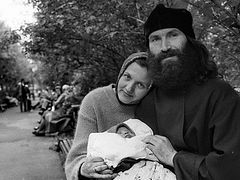I’m the most unfit person to speak to you about all of this: I am a monk, I’ve never been married, I haven’t been to a wedding since I was twenty-two—so imagine how unsuited I am to speak to you about such things, since I have no connection with them. I come from Holy Mount Athos, and I am telling you what the ascetic fathers—people having no relation to all of this—have to say.
When you read the fathers, you find this balance, this vision of things. But how did they know about it? Because they lived rightly in the Church, so they didn’t need any kind of philosophy to tell someone how to communicate with others.
This is what we learn in monasticism. Do not think that monasticism differs in this respect. We also learn to communicate with others in the monastery, with the help of obedience, humility, and asking forgiveness—understanding that it was you that made a mistake, and not the other person. Maybe you outwardly have a right to something. I spoke with my elder about this many times, and he would answer me, “If I were a judge, I would tell you: ‘You have the right.’ But you don’t have the right, even if you have the right to it! Because you’re not looking at things in a spiritual way.”
So someone else insulted and slandered you—receive it spiritually: Do not answer evil with evil. You will thereby help him. It means you have to take responsibility, and one great saint of the Church says, “Take the mistake upon yourself and say, ‘I’m wrong here!’” It doesn’t matter that, according to the law, the other person doesn’t have the right. It’s me that’s mistaken, and I take this mistake and responsibility upon myself. I learn to work on myself inwardly, and therefore I can communicate with others; I learn to conquer myself and do everything I try to learn in the monastery.
Do you know how difficult this is? It’s not easy, and it’s not easy in marriage either. It’s difficult, as difficult as in a monastery—that is, to learn to communicate with others and stand for ten hours at the Vigil, while the person next to you is sniffling, snoring, and smelling bad. You don’t want to endure it and you say, “This annoys me!” And what does “this annoys me” mean? Nothing at all—you’re still going to be standing there.
I remember one monk from the Holy Mountain. One of the monasteries had many monks who had trained in sports. At one time, many young people from the sports academy in Athens became monks: boxers, athletes, and they looked like giants. And there was one monk in this monastery who, the poor guy, was small, and they put him in the middle, with boxers standing on either side of him, looking him up and down during the Vigil. He said, “I can’t do this, I’m scared! I see these creatures above me, who are twice my height!”
But he had to stand there, to learn to overcome himself, to break himself, in order to accept other people, and not just say, “You know, I’m tolerate you!” That is unacceptable. Not “I endure you,” but “I love you!” Really. Christ didn’t tell us “tolerate your enemy,” but “love your enemy” (cf. Mt. 5:44)! We must die for our enemy, Christ says, and we must love him as ourselves (cf. Mt. 19:19). And if we have to love our enemy as ourselves, then how much more our spouse, friends, neighbors, co-workers, and brothers?
What seems so simple, what we talk about so easily, is the greatest podvig for man—to conquer himself. But to do it so that he won’t be afraid, but will even feel some comfort in it, he must first overcome death, so he would have no fear before it. But to achieve this, man must taste immortality, feel that something exists beyond these things, and taste God’s love, which sets you free. It gives you the feeling of immortality, by which you defeat death and won’t fear anything anymore: not slander, nor offenses, nor even being killed—nothing. You go through everything in a perfect world, without any difficulties, because you have real freedom, born of a correct view of things, of a correct connection with God, and most of all—of the presence and blessing of God.
Many ask today: “Is it really bad to have a relationship with someone?” Well, of course, my children, when you’re getting married and want to take a girl for yourself, and women a man, then—how to put it?—you’re not going to be handed some black box that you open and some woman pops out, and she won’t be sent to you in the mail; that is, the will of God isn’t revealed like in stories. You’re sure to meet someone else, some girl, and start dating her; you’ll talk, eat, sit, and talk on the phone. People talk for hours on the phone now. And it’s just a disaster if you have to make a call from a house where there’s young people—you’re done for. Parents have to get another phone line, because the phone is constantly busy.
But since there’s only one line, it can sometimes be comical. Imagine—if you mute the sound and look at your face in the mirror—what we do when we’re talking on the phone… Sometimes I follow people talking on their phones in their cars, and now it looks even funnier because they’re afraid of the police catching them. They’re talking into a microphone attached somewhere, and you’re looking at this guy, and he’s walking and smiling, waving his hands, frowning, or showing complete bliss. If it weren’t for this device, he’d have to be taken to a psychiatrist because something is wrong with him.
Or you see someone driving with a strange smile on his face. We’ve already learned to talk through these things and we express ourselves through them. You see how he talks on the phone and even how he expresses his love for it: stroking it, or even suddenly starting to beat it. How many cell phones have been launched into the air?
That’s how it is. All of this has made us impersonal beings. We have become wires—communicating through wires; everything through wires.
I want to say that we really can and must meet other people. Listen, we have to overcome these unhealthy fears. The Church teaches us how to correctly look at the person next to us. In monasticism we also learn to look at others beautifully and sacredly. The holy apostle Paul says in Christ there is neither male nor female (cf. Gal. 3:28), which means you’re stepping over gender, not looking at others as a man or woman. The Church insists upon the personality, the name of a person: Kostya, Maria, Elena, George—that is, everyone has a name, and gender is not the main way of representing ourselves, as doctors claim.
For example, someone goes to the clinic, and the doctor says, “Send the bile in,” “Send the liver in,” “Send the blind guy in.” Don’t they have a name? What, am I “bile” if I have bile reflux?
I don’t know if you’ve heard, my children, but doctors ask, “And who is this?” “It’s bile,” “It’s stones.” Alright, but it’s actually Kostya who has a problem with bile. He’s a person, who has some kind of sickness. He’s not bile, not lungs, not a heart.
So the other person isn’t just male or female, but is a personality, a person. When we learn to have this sacred feeling, then you truly can go out with some girl: She won’t bite you, and you won’t bite her either. For God’s sake, will we really bite one another if we go out on the street, to walk, eat somewhere, talk? That is, is there really no longer a chance that two people will simply talk without deceit, or something carnal and dangerous?
Yes, but how can someone be sure of this if he is taught from a young age to look at others in a certain way? All these things they advertise… Unfortunately, the biggest harm comes from those shameless things they show on TV, so as not to call them by name. But they’re bestial things, so bestial…
It’s terrible how damaged the human soul becomes when it sees such things. I think whoever sees such things—magazines, movies—will require great labor to overcome it and look at something else with an innocent gaze. At the same time, the mind of a pure man doesn’t even seek for that. It isn’t that way, and speaks with others quite comfortably.
Our goal is to learn to overcome such difficulties and have comfortable, beautiful relationships. That is, gender is the not the main thing that characterizes us. These moments are overturned in the Church, but not in the sense that we are made into some neutral gender—no! But in the sense that we already really communicate as people, and these moments acquire a sacred character and dignity. Therefore, we can calmly get to know someone else, respecting him, loving him; and respecting another, we respect ourselves and the presence of God, without speaking any lies and without giving any false promises.
You see that betrothal is celebrated before God and before many witnesses, and you say, “I want this girl, to walk with her through life, that she would become my wife.” It’s very serious to say, “I love this person,” and to prove it and receive God’s blessing. You confess it before all people, before God, and you even wear a ring as a guarantee, testifying that you are truly serious.
It’s very important and serious to think about what you will say to another, what kind of promise you will give him: “I truly love you and I want us to get married, and live our entire lives together!” It means that this is preceded by much else: maturity, and most of all, the awareness that our words are extremely important for the other person. Perhaps for you they are insignificant, but for the other—they are important. And you have no right to play with another’s feelings.
Know that he who betrays others will pay for it. It’s not easy if someone else murmurs about us, cries about us, because there will come a time when we will pay for it. And it’s not bad that we will pay—we should pay. That is, we will be hurt in order to learn not to hurt others. When various hardships arise in our life and people hurt us, then let us remember that we have also hurt others.
It’s very unpleasant for someone else to cry because of us—that we would be the reason that someone else begins to grumble—that someone else is hurt, even if he doesn’t say it out loud. What a great blessing it will be for us if someone prays for us.
Look, my children, we go to a wedding and we wait for them to bring our food—why do we do this? Why? We treat our guests with delicious dishes at our celebrations so they would like them. In reality, we do it so others would eat, rejoice, and say, “Long life and health to you! I ate good, delicious food, my soul rejoiced, and I wish for you to be alive and well, my child!” As in the prayer, For Thou, LORD, hast made me glad through Thy work (Ps. 91:5).
We ate good food—we thank God. The Church teaches us to perform an entire “liturgy” before sitting down at the table. If you go to a monastery, we eat there for twenty minutes, but there is an entire “liturgy” around that; we cense and we sing; it’s an entire adventure to partake of this food. But why? Because you were sated, you’re having a good time, and you bless God.
A hungry man can’t wish you anything good. The meaning of eating at a wedding is: “Eat these goodies, that your soul would exalt and that you would wish me many years and health!” This is the point.
And I bring you a gift to express my great love for you. What great significance this has—to tell someone else with all your heart: “May you have many years of good health, and may God bless you!” Remember, my children, we all have friends, for whom, when we think about them, we wish in our heart: “May he live long and be healthy!” It comes from within us, and we feel power coming from us, covering this person, wherever he is.
Moreover, my children, when someone else is hurt by us, then he cannot curse us, cannot murmur against us if he is a Church person; but this wound and pain of his is a great burden on you. It’s a very hard thing—hurting another is a serious wound. That is, the hour is coming when we will pay for it.
You’ll say, “But I’ve repented!” Yes, you repented, but the other person was still wounded. You repented, and God accepts your repentance, but, for our repentance to be fulfilled, we, unfortunately (I pray this doesn’t happen), must pay for it. These things usually return to us, like for example abortions. The mother, or whoever is killing the child, says, “Yes, I had an abortion, but then I confessed!” Alright, you confessed, repented, and wept, but there will always remain one “but”—the person who went to the other world. Who will pay for it? Who can replace him? Who will pay for this wound?
We should be very serious. Never hurt another. It’s better not to tell someone else that you don’t love him; wait him out and let him yearn in anticipation. Don’t tell him. It would be better if he didn’t know, even if he asks you a thousand times, than that you would say such a painful word to him.
Therefore, we must always have this feeling of responsibility and be consistent towards others—to God and towards others. This is what the Church helps to establish with the Sacrament of Marriage, and our presence there speaks about it—how important it is to have the correct attitude towards others. The Church doesn’t do it secretly, but in church, before all people—before the priest, before our parents, before God, and you even vouch for it; the ring is a guarantee and pledge that you will relate to this connection seriously!





